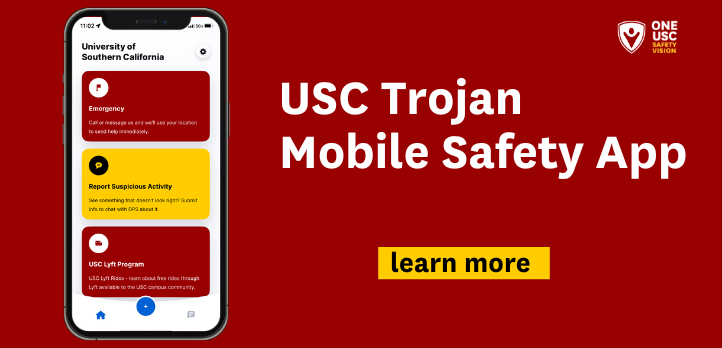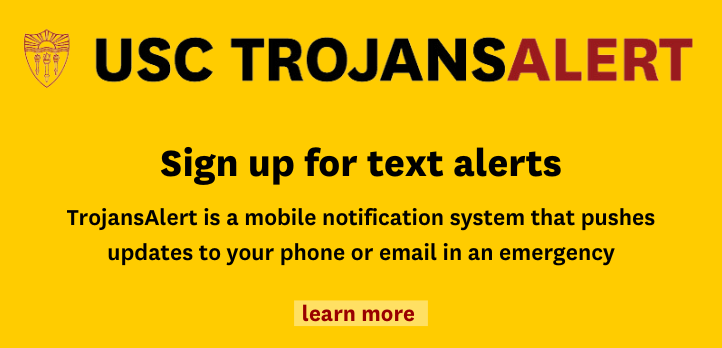SCAM ALERT
The USC Department of Public Safety has received reports from students, many of whom are international students, who were deceived into giving money to impostors posing as law enforcement officials or representatives of agencies including the Social Security Administration, IRS, U.S. Customs, U.S. Citizenship and Immigration Services and Department of Homeland Security. Some impostors or “scammers” represent themselves as a government official from an international student’s home country.
Last year alone, USC students reported being victims to these scams with a combined total loss of more than $1 million. To avoid being a victim of a scam, please read the following information carefully:
TIPS TO AVOID SCAMS
1. International Police Extortion Scams
In a recent FBI Public Service Announcement, the FBI is warning the public about scammers impersonating Chinese police officers to defraud the US-based Chinese community and in particular, Chinese university students.
Scammers will mask (or “spoof”) their true phone numbers and make it appear as if they are calling from a mobile telephone service provider, a large retailer, a delivery service, or the Chinese Embassy/Consulate. The scammers tell victims that their personal identifiable information is linked to a subject or victim of a financial fraud investigation.
A scammer posing as a Chinese police officer then informs victims of the details of the financial fraud investigation. The scammer then provides the victim with fraudulent documentation such as purported law enforcement credentials, the victim’s Chinese national identification photo, and other documents outlining the alleged charges.
The victim is then told to return to China or they will be arrested. They are also told to consent to 24/7 video and audio monitoring, to report their daily activities, and to not conduct any internet searches. The scammer then directs the victim to wire a large sum of money to a Chinese ban account to prove their innocence or to post bail to avoid having to return to China. The scammers have also been reported to direct victims to lie to their friends and family, to serve as a money mule, or to facilitate a similar criminal scheme against other US-based Chinese university students.
If you are contacted by someone accusing you of a crime, do not release any personal or financial information, do not send any money, and cease contact with the individual. If you are contacted by any government agency for an allegedly official purpose, you may verify the contact is official by directly contacting the agency to confirm the legitimacy of the interaction.
If you or a fellow student receive a call like this, report it to your local FBI field office. Also, report it online to the FBI Internet Crime Complaint Center (IC3) at www.ic3.gov.
2. Phone Calls and Emails
Never provide personal information or money to anyone who has contacted you by phone, email or social media claiming you have violated your immigration status or owe taxes and must wire money or buy gift cards in order to straighten out your immigration status. In many cases, callers will use a technique to mask their true caller ID with another government listed phone number or number of a private institution like a bank. If you are unsure about who is calling, tell the individual that you are busy and write down the caller’s name and phone number. If the caller refuses, hang up. Government agencies do not request payment over the phone.
If you are contacted by a scammer, do not reveal any personal information. Ask for the individual’s contact information and report the incident immediately to DPS and/or your local law enforcement agency.
3. Tax Scams
Scammers also try to get you to give them money by calling and saying they are with the IRS. An increasing number of phone scams have occurred in which people will call and threaten you with police arrest and/or deportation if you do not pay them.
It is important to know, even if you do owe taxes:
The IRS will never call to demand immediate payment over the phone.
The IRS will never threaten or intimidate you, demand payment with a prepaid debit card or ask for your credit card or debit card number over the phone.
The IRS will never threaten to call the police or immigration agents if you do not pay.
If you or a fellow student receive a call like this, report it to the Treasury Inspector General for Tax Administration online, or by calling (800) 366-4484. Also, report it online to the Federal Trade Commission.
WHAT TO DO IF YOU BELIEVE YOU HAVE BEEN DECEIVED
If you believe that you are a victim of theft because you have been tricked or deceived, please notify DPS at:
University Park Campus (213) 740-6000
Health Sciences Campus (323) 442-1200
If you are in immediate danger, call the LAPD at 911 or DPS at (213) 740-4321 for UPC or (323) 442-1000 for HSC.
If you have any questions regarding this advisory, please contact the DPS Community Relations Office at (213) 821-6690.
USC Department of Public Safety
If you are in immediate DANGER, call the Los Angeles Police Department at 911 or the USC Department of Public Safety at (213) 740-4321.
Please note that race, ethnicity, gender and/or religious affiliation are NOT considered the basis for suspicion; only behaviors are considered suspicious.
If you have information relevant to the crime(s) reflected in this alert, immediately call DPS at (213) 740-6000 for the University Park Campus (UPC), (323) 442-1000 for the Health Sciences Campus (HSC) or (213) 485-6571 for the LAPD Southwest Division.
The purpose of this warning is to aid in the prevention of similar crimes by alerting the community about the incident and to provide information which allows individuals to make informed decisions about their personal safety.
USC Department of Public Safety Recommendations
- If you feel you may be in danger, immediately go to a safe location and report the crime to law enforcement. Call DPS emergency for UPC at (213) 740-4321, for HSC call (323) 442-1000, or call 911 for LAPD.
- If you observe a crime in progress, STAY CALM AND CALL DPS emergency for UPC at (213) 740-4321, for HSC call (323) 442-1000, or call 911 for LAPD. Do not attempt to apprehend any suspects or perpetrators of crime. Your personal safety and the safety of others around you should be your primary concern.
- Not every person you meet has good intentions. Be cautious of strangers and keep a safe distance. There is safety in numbers, so travel with friends.
- Avoid using cell phones or other technology while walking as criminals target distracted, inattentive individuals using them.
- Be a good witness: It is important to recall what you observed and provide as many details as possible to law enforcement such as: the sex, race, age, height, hair color, clothing, tattoos, scars of any suspects and a description of the make and model of any vehicle used in the crime and its license plate if possible.
- Do not attempt to apprehend any suspects or perpetrators of crime.
Other options to contact DPS, to report crime, ask for help and to receive information:
- Blue light emergency phones are located throughout UPC and HSC. The phones are connected to the USC DPS’ 24-hour communications center and identify the phone location if the caller is unable to speak. The phones can be used to request help, an escort, report suspicious activity and to report crimes. For more information visit: Emergency Blue Light Phones | Department of Public Safety | USC.
- Security Ambassadors: In addition to DPS officers who patrol a 2.5 mile radius around USC’s campuses, USC contracts with “Security Ambassadors” to patrol street corners in nearby neighborhoods and to observe and report crime and suspicious activity. This security force wears bright yellow jackets so you can easily spot them. If you need assistance, look for a Security Ambassador.
- Get a Ride: Lyft is now available at HSC and UPC to cover shared rides. Lyft at UPC is open from 6 p.m. to 2 a.m. seven days a week. Lyft at HSC is open from 5 p.m. to midnight, Monday through Friday only. Please visit the USC Lyft page for more information: https://transnet.usc.edu/index.php/campus-cruiser-program/how-to-use-lyft/
- Verify your driver and car: Once you have requested a Lyft ride, you can view the driver’s rating. When your ride arrives, make sure the driver’s photo, license plate number and vehicle description match. Never take a ride you did not request or get into a car that doesn’t match the details provided by the Lyft app.
- Go the extra mile: The Lyft app’s “share your ETA” function allows you to invite friends to see your trip in real-time. The app will draft a text message you can share with friends that includes your ETA and a link to a live map that allows them to track your trip. Too much effort? Call a friend and stay on the line while you’re in the car instead.
- LiveSafe APP: To quickly make emergency push button calls to DPS or 911 on your mobile phone, download the Trojan Mobile Safety APP “LIVESAFE” from Google Play or the Apple iTunes Store. For more information regarding LIVESAFE visit https://dps.usc.edu/services/safety-app/.
- TrojansAlert: Register for USC’s emergency notification system TrojansAlert to allow university officials to contact you during an emergency by sending messages via text message and email. For more information visit: http://dps.usc.edu/services/trojans-alerts/. (Please note that students, staff and faculty automatically are signed up for TrojansAlerts.)

